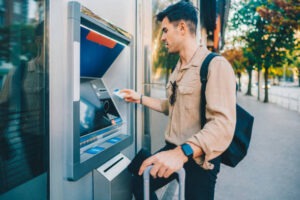
Deciding whether to exchange currency before traveling depends on various factors, including your destination, the availability of ATMs, and the fees associated with different exchange methods. Here are some considerations to help you make an informed decision:
Using ATMs Abroad :

-
-
Competitive Exchange Rates: Withdrawing cash from ATMs in your destination country often provides favourable exchange rates compared to currency exchange services. Convenience: ATMs are widely available in most countries, allowing you to withdraw local currency as needed.
-
-
Cons:
-
Fees: Your home bank and the local ATM operator may charge fees for international withdrawals. It’s advisable to check with your bank about these fees before traveling.
-
Card Compatibility: Ensure your debit or credit card is compatible with international ATMs and inform your bank of your travel plans to avoid any service interruptions.
-
Exchanging Currency Before Departure:
-
Pros:
-
Immediate Access: Having local currency on hand upon arrival can be convenient, especially for immediate expenses like transportation or tips.
-
Rate Lock-In: Exchanging currency before departure allows you to secure a known exchange rate, protecting against potential fluctuations.
-
-
Cons:
-
Potentially Less favorable Rates: Currency exchange
-
services, particularly at airports, may offer less favorable rates and higher fees compared to ATMs abroad.
-
Understanding exchange rates and associated fees is crucial for managing your finances effectively while traveling. Here’s a comprehensive guide to help you navigate these aspects:
Current Exchange Rates:

-
US Dollar (USD): 1 INR ≈ 0.01167 USDRemitly+8Wise+8XE.com+8
-
Euro (EUR): 1 INR ≈ 0.01083 EUR
-
British Pound (GBP): 1 INR ≈ 0.00904 GBPHSBC India+5XE.com+5Wise+5
Please note that these rates are indicative and can change frequently. For the most accurate and up-to-date rates, consider using reliable currency converters like XE Currency Converter or Wise Currency Converter.
Fees Associated with Currency Exchange:
When exchanging currency, various fees may apply, depending on the method and service provider:
-
Bank Fees:
-
Foreign Exchange Charges: Banks often charge a percentage of the amount exchanged. For instance, HSBC India applies the following charges:HSBC India
-
Up to INR 100,000: 1% of the gross amount exchanged (minimum INR 250).
-
From INR 100,000 to INR 1,000,000: INR 1,000 plus 0.5% of the gross amount exchanged.
-
Above INR 1,000,000: INR 5,500 plus 0.1% of the gross amount exchanged (maximum INR 60,000).
-
-
-
Credit/Debit Card Fees:
-
Foreign Transaction Fees: Many banks impose a foreign transaction fee on international purchases, typically around 3% of the transaction amount. It’s advisable to check with your bank regarding these fees before traveling.
-
-
Currency Exchange Services:
-
Service Charges: Providers like Thomas Cook offer competitive exchange rates with transparent fees. It’s essential to compare rates and fees among different providers to ensure you receive the best deal.
-
-
Online Money Transfer Services:
-
Transfer Fees and Exchange Rates: Services like Remitly offer promotional exchange rates for first-time users, such as 1 USD = 85.66 INR, with no hidden fees. However, standard rates and fees apply for subsequent transactions.
-
Tips to Minimize Exchange Costs:
-
Compare Rates and Fees: Before exchanging money, compare rates and fees across various banks, exchange services, and online platforms to find the most favorable terms.
-
Use Local ATMs: Withdrawing cash from local ATMs in your destination country can offer competitive exchange rates. Be mindful of any international ATM fees your bank may charge.
-
Avoid Airport Exchanges: Currency exchange services at airports often have higher fees and less favorable rates. It’s better to exchange a small amount for immediate expenses and seek better rates elsewhere.
-
Notify Your Bank: Inform your bank and credit card companies about your travel plans to prevent any fraud alerts or service interruptions.
By staying informed about current exchange rates and understanding the various fees involved, you can make cost-effective decisions when managing your money abroad.
When You Should Exchange Money Before Traveling

✅ Traveling to a Remote Area – If ATMs or currency exchange services are scarce, it’s best to have local cash in hand.
✅ Arriving Late at Night – Some currency exchange locations may be closed when you arrive.
✅ Your Destination is Cash-Heavy – Some countries, markets, or small businesses may not accept credit cards.
✅ You Want to Lock in a Good Exchange Rate – If your home country offers better rates, it can be smart to exchange in advance.
When You Can Exchange Money After Arrival

✔ Your Bank Offers Fee-Free International Withdrawals – Some banks and travel credit cards don’t charge foreign transaction fees.
✔ You’re Comfortable Using Credit Cards – Many places accept cards, especially in tourist-friendly countries.
💰 Exchange a Small Amount Before You Go – Having at least $50-$100 worth of local currency for immediate expenses (transport, food) is a good idea.
💳 Use Travel-Friendly Credit/Debit Cards – Cards with no foreign transaction fees and free ATM withdrawals save money.
🚫 Avoid Airport Exchanges – They usually have the worst exchange rates and high fees.
Where are you traveling to? I can help check the best currency exchange options for that country! 🌍💵
Recommendations:
-
Assess Your Destination: Research the availability of ATMs and the acceptance of credit/debit cards in your destination country. In cash-centric locations, having local currency upon arrival may be more crucial.
-
Obtain a Small Amount of Local Currency Before Departure: Consider exchanging a modest sum before you leave for immediate expenses upon arrival. This approach balances convenience with the potential for better rates on larger sums withdrawn from ATMs abroad.WorldRemit+1The Sun+1
-
Inform Your Bank: Notify your bank and credit card companies of your travel plans to prevent any fraud alerts or service interruptions.
-
Use Credit Cards for Purchases: When possible, use credit cards for transactions, as they often offer competitive exchange rates and fraud protection. Be mindful of any foreign transaction fees your card may impose.
